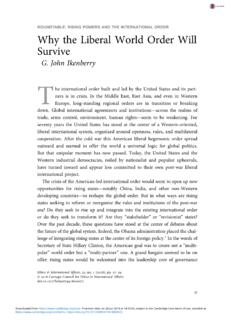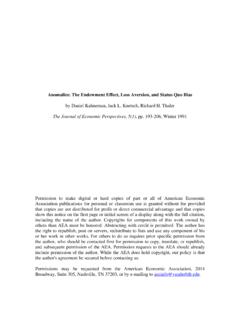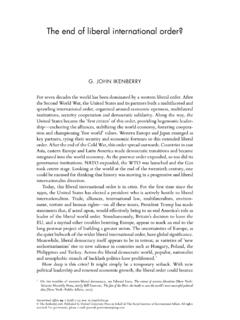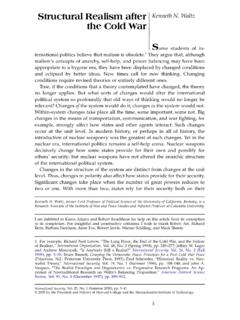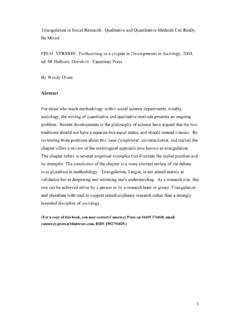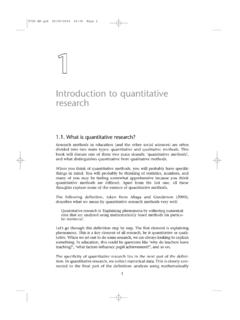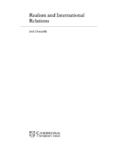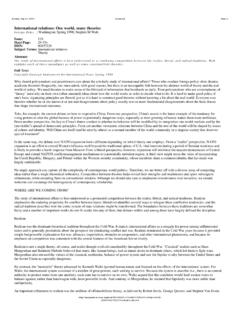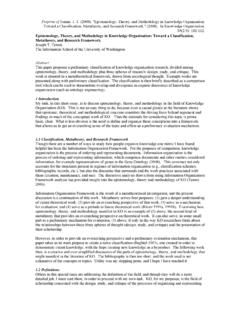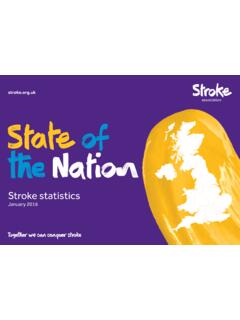Transcription of Liberalism in a Realist World: International Relations as ...
1 The author is Albert G. Milbank Professor of Politics and International Affairs in the Department ofPolitics and the Woodrow Wilson School of Public and International Affairs, PrincetonUniversity, USA and Global Eminence Scholar at Kyung Hee University, Seoul, : He wishes to thank the anonymous referees for their use-ful comments on the in a Realist World: International Relations as anAmerican Scholarly TraditionG. John IkenberryThe study of International Relations (IR) is a worldwide pursuit with each country having itsown theoretical orientations, preoccupations and debates.
2 Beginning in the early twentiethcentury, the US created its own scholarly traditions of IR. Eventually, IR became an Americansocial science with the US becoming the epicentre for a worldwide IR community engaged ina set of research programmes and theoretical debates. The discipline of IR emerged in the USat a time when it was the world s most powerful state and a liberal great power caught in astruggle with illiberal rivals. This context ensured that the American theoretical debates wouldbe built around both power and liberal ideals.
3 Over the decades, the two grand projects ofrealism and Liberalism struggled to define the agenda of IR in the US. These traditions haveevolved as they attempted to make sense of contemporary developments, speak to strategicposition of the US and its foreign policy, as well as deal with the changing fashions and stand-ards of social science. The rationalist formulations of realism and Liberalism sparked reactionsand constructivism has arisen to offer counterpoints to the rational choice : International Relations Theory, Realism, LiberalismThe study of International Relations (IR) is a worldwide pursuit but every countryhas its own theoretical orientations, preoccupations and debates.
4 This is true forthe American experience and deeply so. Beginning in the early twentieth cen-tury, the US created its own scholarly traditions of IR. Eventually, IR became, asHoffmann (1977) famously argued, an American social science. The US becamea sort of epicentre for the intellectual community around the world engaged in anevolving set of research programmes and theoretical debates. America s rise toINTERNATIONAL STUDIES 46, 1&2 (2009): 203 19 SAGE PublicationsLos Angeles/London/New Delhi/Singapore/Washington DCDOI: at PRINCETON UNIV LIBRARY on October 22, from 204 / G.
5 JOHN IKENBERRYI nternational Studies 46, 1&2 (2009): 203 19global preeminence, its liberal democratic ideals, the world wars, the post-wargrowth of the liberal capitalist world system and the ongoing transformations ofthe post-war social sciences and policy institutions all these developments helpedin giving shape to the intellectual foundations and scholarly pathways of theAmerican field of course, the ideas that form the core of American-style International relationsare not home grown. Liberal International ideas can be traced to Britain andnineteenth century Anglo-American liberals, and Realist theory can be traced tothe European experience and German academic refugees of the 1930s.
6 The phil-osophical roots of realism and Liberalism are sunk deep in the ancient and Enlight-enment West. Likewise, the problems or enduring issues of IR are reallyuniversal. These issues include the sources of war and the conditions of peace;the rise of the nation-state and Westphalian sovereignty; the changing characterof anarchy and power; the rise and decline of major states; the various logics oforder and governance; the relationship between International politics and inter-national economics; the role of law and institutions in managing conflict andinterdependence and the emerging significance of non-state actors and transitionalcivil society.
7 These issues are manifest on a global scale, and so they are issuesthat studied in any country or region should grapple with. Nonetheless, differ-ences in orientations and foci article seeks to provide a portrait of the American scholarly field of IR asit has unfolded over the last century. There are many ways to characterize and de-fine American-style IR. And it is possible to argue that a singular portrait or intel-lectual account of the field is impossible to render. The areas of research, theoriesand methods have all proliferated in recent decades to the point that it is hard tosee a centre or core.
8 As William Butler Yeats might say, with the wideninggyre of work on IR, the centre has not held. Many of the sub-fields and evensub-sub-fields of the discipline are almost intellectually self-contained. Theyhave their own landmark works, debates and journals. In turn, some of these sub-fields are now organized as transnational networks of scholars that are largelydisconnected with something that might be called the American IR tradition(Crawford and Jarvis 2001; Holsti 1985).1 Nonetheless, my thesis is that the American academic field of IR has been de-fined by an ongoing grand debate between realism and Liberalism .
9 In the mostgeneral sense, these two sprawling intellectual traditions provide the bulwark forwider and specific debates and research programmes. This is true because thesetraditions provide large, alternative world-historical perspectives on IR. Onefocuses on power, anarchy and order. The other on society, interdependence and1 For surveys of the American discipline of IR, see Holsti (1985). See also the debate in Crawfordand Jarvis (2001). at PRINCETON UNIV LIBRARY on October 22, from Liberalism in a Realist World / 205 International Studies 46, 1&2 (2009): 203 19progressive change.
10 They are also adaptable to changing substantive and methodo-logical tastes. Indeed, the debates themselves within and between these two grandtraditions have evolved a great deal since the early- and mid-twentieth century. Inthe twentieth century, the US has found itself to be the world s most powerful andwith most opportunities for shaping the global system the American academicfield of IR has grown in the shadow of these basic historical , in accounting for the character and evolution of the American scholarlydiscipline of IR.






